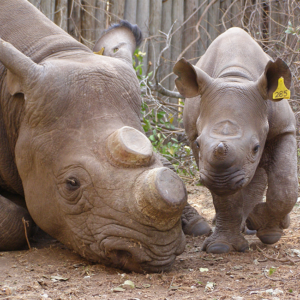EWT looking into new technologies to curb rhino poaching
By Eleanor Momberg

The Endangered Wildlife Trust continues to work on ways to unlock new technologies to curb the onslaught on South Africa’s rhino population, says Louwrens Leeuwner, Senior Conservation Manager: Business and Wildlife.
Reacting to the recent poaching of rhino in Limpopo, days after the release of the 2023 rhino poaching statistics, Leeuwner renewed an appeal to the public to come forward with any information about the killing of the iconic animals, and to support the authorities in dealing with poaching incidents as this may “ultimately be the only way” to deal with the problem.
Forestry, Fisheries and the Environment Minister Barbara Creecy announced earlier in February that 499 rhino were poached across South Africa in 2023, more that 60 percent of which were killed in KwaZulu-Natal. This is an increase of 51 rhino poached compared to 2022. Of the pachyderms killed, 408 were poached on state properties and 93 on privately owned land.
“The pressure again has been felt in the KwaZulu-Natal (KZN) province with Hluhluwe-iMfolozi Park facing the brunt of poaching cases losing 307 of the total national poaching loss. This is the highest poaching loss within this province. While KZN recorded 49 arrests and 13 firearms seized, multi-disciplinary teams continue to work tirelessly in an attempt to slow this relentless pressure,” said Creecy.
Kruger National Park (KNP) recorded a 37% decrease from 2022 with a total of 78 poached in 2023. No rhinos were poached in other national parks.
Creecy commended the work being done by the Hawks in several regional and transnational engagements to enhance the government’s integrated approach to combat wildlife trafficking.
She said responsible partnerships between the public and private sectors, and the financial and transporting sectors remains critical in combating international wildlife trafficking. The approach is not exclusive to South Africa but is followed within the region and transnationally. Working with the transit and end user countries in South-East Asia, especially with the People’s Republic of China, Singapore, Qatar, Malaysia and Vietnam.

Ashleigh Dore, Wildlife and Law Senior Project Manager at the EWT said wildlife crime was having huge impacts on South Africans.
“It is a personal attack on our heritage so all wildlife crimes need to be taken seriously,” she said.
Dore added that rhino poaching was a prime example of transnational organised crime, or transnational wildlife crime. “I think people need to understand how complex it is responding to transnational organised crime and understand the different levels and roleplayers in syndicates. When we look at poachers we are looking at people operating at the first level. But there are other levels of wildlife crime that need consolidated efforts and we see that globally,” she said.
In the meantime, the wildlife crime monitoring group, Traffic, reports that a Singapore court has convicted South African national, Gumede Sthembiso Joel, for rhino horn smuggling and sentenced him to two years in prison. This was the maximum terms allowed for the offence under the law at the time of his arrest in 2022 when he was nabbed smuggling 20 pieces of rhino horn from Johannesburg to Laos via Singapore.
